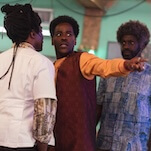“Commander-In-Chief” finds our hero getting a few more pieces of intel on the conspiracy that put him in the White House, but those pieces don’t really tell us anything new. Langdon, the other unexpected survivor of the capital bombing, turns himself in on the hopes that the information he provides will be enough to save him from a death sentence. His story mostly serves to tie together what we already knew. The woman who contacted Jason after his son was kidnapped helped orchestrate Langdon’s involvement, using him for intel (without his awareness, at least according to him) and then getting him out of the city before everything blew up. Going under the name “Claudine Poyet,” she also blackmailed him into putting Kirkman in the designated survivor role.
None of which is really bombshell-worthy. In terms of the overall mystery, this episode is really mostly about setting up a new status quo by the end, with Aaron officially resigning as Kirkman’s Chief of Staff, and Hannah getting pretty much carte blanche to pursue the truth, provided she stays within the bounds of the Constitution. But Langdon’s confession does serve to underline once again how Kirkman was not qualified for his current job, to the point where it’s entirely likely that the bad guys actually chose him specifically in the hope that his inexperience would aid their dastardly plans.
That’s not a new theme for the show, but it’s still a potent one, especially now as the president finds himself forced to adjust to yet another crisis, this time on the international stage. A guerilla warlord in Naruba, Africa is laying waste to the country with his army, and headed for the capital (and a potential genocide) unless some country takes a stand. Thanks to Russia’s cold feet, the U.N. Security Council vetoes any effort to intervene, and the U.S. military plan to use drones to take out the warlord and his men goes awry when said warlord kidnaps a group of American relief workers. What’s a newly minted, deeply moral world leader to do?
Fortunately, Kirkman has a new buddy: former President Cornelius Moss (Geoff Pierson). It’s an interesting dynamic, as Moss immediately fits in with the new White House, offering Kirkman a harsh but largely fair assessment of the man’s efforts so far as Commander in Chief, and then sticking around to provide advice to get him through the latest crisis. Bringing in a mentor figure now almost makes things a little too easy—while it’s nothing new for the show to introduce seemingly complex ethical problems only to find a guilt-free solution by the fifty minute mark, the fact that Moss hands him a large part of the answer (and even does all the leg work for him) robs this crisis of a large part of its oomph.
Two things save this from being a complete loss, though. For one, Kirkman does manage to pull out a solution that feels entirely appropriate for what we know about him; after the Americans are rescued, Kirkman has the drones destroy certain key piece of infrastructure that will slow down the warlord’s army, buying Moss time to negotiate with the Russians. Again, this is a little too convenient, as the show’s willingness to offer up problems that legitimately have perfect solutions seems more than a little naive sometimes. But it’s still better than just having Moss wrap the whole thing up in a neat bow on his own.
The other thing that saves this is more speculative, but I’m guessing the show will be smart enough to put Kirkman and Moss into conflict down the line. As humble as the new president is, he’s also not a man who will back down when he believes he has the right of things, and his idealism will almost certainly clash with Moss’s more pragmatic approach. Given that Kirkman offers Moss the Secretary of State position (and Moss accepts) before the hour’s end, I can only assume there will be problems down the line. And hell, who knows. It’s entirely possible that Moss is a key part of the conspiracy. He did, after all, volunteer to come back after retiring from public life.
The other major event this week has Aaron resigning. It’s an unexpected turn, and one I appreciated, putting a neat spin on what had seemed a fairly binary situation. Given how long the character had been under suspicion (I mistrusted him from the start, sad to say), there really seemed only two possible outcomes: either we’d learn he’d been in on this all along, or he’d be cleared of all charges and go on his merry way.
As the season continued, and it became more likely that Aaron was a straight shooter, the latter outcome appeared inevitable. But having him decide he can no longer serve now that rumors about his “chat” with the FBI are going to be circling the city is smart, because it offers a consequence for a plotline that’s spun out over several weeks. To have him come back to the Chief of Staff role without any complications would have been too easy, and would have rendered all that time spent questioning his intentions a waste. This way, we can have a win and a loss at the same time, which is honestly something the show could use a bit more of.
Stray observations
- Many thanks to Allison for covering for me last week!
- Okay, I generally liked the episode, and the idea of Hannah getting permission to go after the bad guys however she sees fit is a good one, but I could’ve done without the super corny shot of her at the end.
- Seth brings Emily a bulletproof vest to commemorate her new role in the Kirkman administration. So yeah, totally shipping that.







































